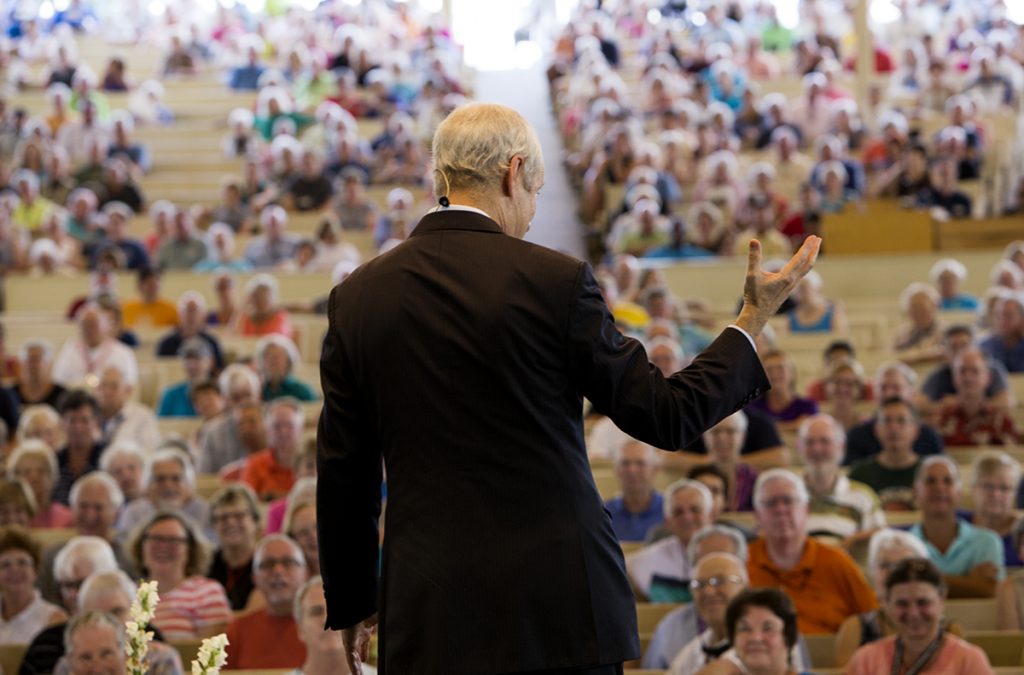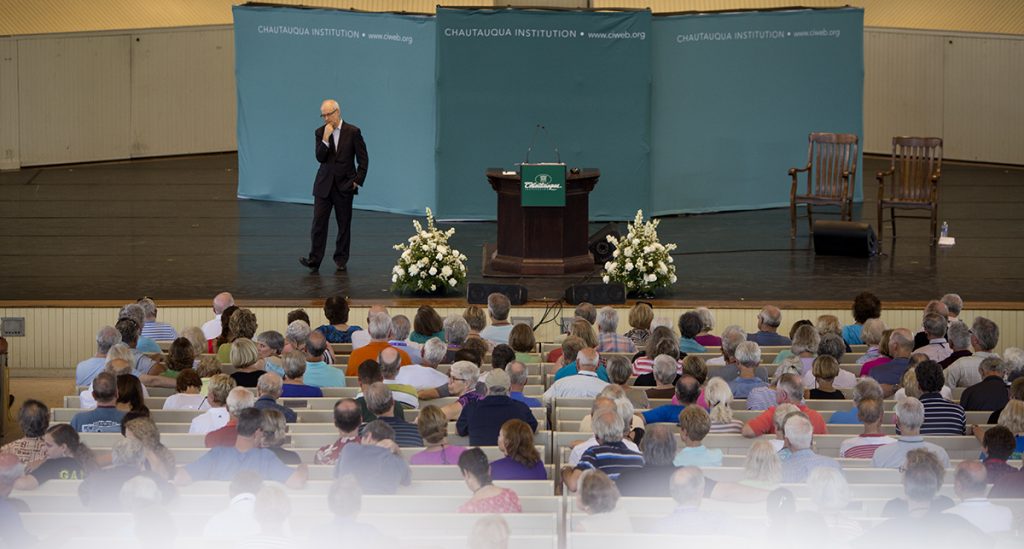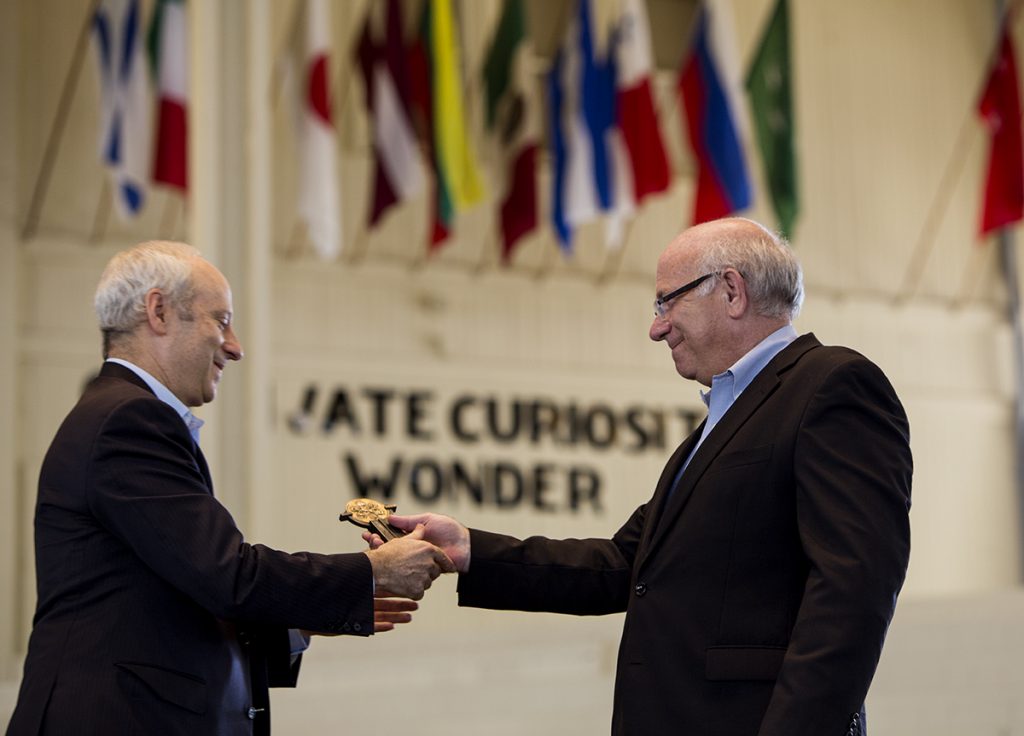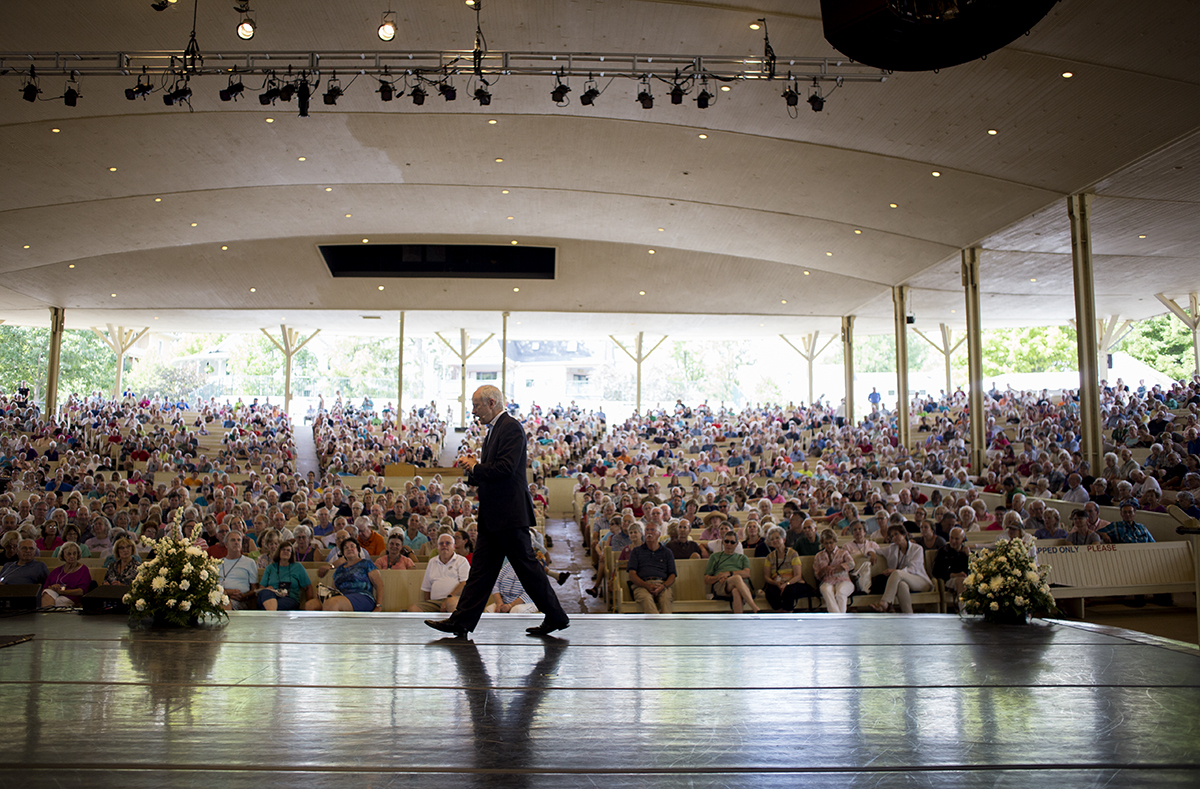Michael Sandel believes difficult questions about politics, morality and inequality need to be valued. Politicians should spend more time listening and reasoning with citizens than participating in “shouting matches” on television and radio.
Sandel, the Anne T. and Robert M. Bass Professor of Government at Harvard University, spoke about the theme “Pushing Our Bodies’ Limits” Friday in the Amphitheater by engaging the audience in a Socratic discussion about pushing limits through enhancements and technology.
Before the dialogue, President Tom Becker presented Sandel with the President’s Medal. Sandel has been a regular lecturer at Chautauqua Institution since 2000, and has spoken on both the morning lecture and Chautauqua Literary and Scientific Circle platforms.
“Democracy these days is not doing so well,” Sandel said. “We see it in our politics. There’s a kind of hollowness in public discourse. What passes for political discourse these days consists either of narrow, managerial, technocratic talk, which inspires no one.”
Sandel said public figures shrink away from debates that address questions about justice, equality and the meaning of the common good because it is to be expected that people, in a pluralist society, will disagree.

“We try to avoid engaging with these questions, but this habit of avoidance, I think, is a mistake,” Sandel said. “It’s a bad habit that we should overcome because the best way, I think, to honor the disagreements of fellow citizens … is not to ignore the moral and spiritual conditions citizens bring to public life, but to engage with them, to reason together, to listen to one another.”
The theme of the week focuses on pushing the body to its limit. Sandel mentioned how his son pushes his body by working out every day. His son recently broke the Guinness World Record for the number of pull-ups done in one minute with a 40-pound backpack.
People around the world admire the athleticism and exertion of the Olympic competitors as they push their bodies to the limits. Sandel said some swimmers resent other competitors who have been known to use enhancements in the past.
Though enhancements such as steroids have been frowned upon in the world of sports, Sandel posed a question to the audience: “Is there really a difference between going to the gym every day, working out strenuously and pushing your body’s limits through the use of drugs or even genetic enhancements?”
In that scenario, Sandel asked the audience to imagine enhancements are legal (meaning it cannot be considered cheating), there are no negative health side effects and they are easily accessible and affordable.
When Sandel asked the audience for a show of hands who believed it would still be morally wrong to use enhancements, a vast majority of the audience raised their hands.
“I think it adverts the whole nature of the competition,” said an audience member who introduced herself as Esther. “My concept of human is naturally human, not artificially. The nature of the competition is maximizing the potential of the human body as it exists.”
Esther said she believes competitions such as the Olympics are designed to celebrate and reward the natural gifts of athletes. Legalizing enhancements would change that design, adding in an artificial aspect such as laboratory-made drugs.
Another audience member, Duncan, countered Esther’s view. Duncan saw no harm in taking enhancements if they are legal, because enhancements such as supplements have been used for decades. He specifically expressed approval for natural enhancements such as vitamins and herbal supplements.
Sandel continued the discussion by asking the opinion of the audience when it comes to pushing the body to the limit intellectually rather than physically. He asked audience members if they would consider getting a brain chip — assuming it is affordable — that would enhance cognitive ability.
The result was more divided, with about half of the audience in favor of the brain chip and half against the idea.
Scientists asked that question in a nationwide public survey, Sandel said. Results showed two-thirds of those polled would not want the brain chip. Males were also more likely to want the brain chip than women.
Sandel asked the audience what they thought about that idea and why they would or would not want the brain chip.
One audience member, Linda, introduced the concept of effort and the benefit of hard work when it comes to intelligence. To her, implanting the brain chip would undermine the efforts and accomplishment that comes with learning.

When Sandel asked Linda if she would change her mind if she knew she would learn a new language within a week, Linda continued to reject the brain chip idea.
“It is tempting, but I wouldn’t want to be any different than God made me,” Linda said. “I wouldn’t want to alter the way I was supposed to be and how much effort I was put on this Earth to put forth. I just wouldn’t want any of it altered.”
In terms of genetic modification in the embryonic stage, another audience member named Killian said superintelligence via a brain chip or genetic alterations to make children stronger in one aspect puts more pressure on the child.
“It’s essentially saying that we don’t want you as you are,” Killian said. “We don’t want you as you’re naturally born to be. We want to change you to make you better.”
Killian asked Sandel to imagine if the parents who try to control their children into being professional chess players or dancers or musicians had the control to alter the child’s brain. The child’s life would ultimately be predetermined by the parents even before birth.
Sandel said Killian made an interesting point. Allowing those types of genetic modifications would turn parenting into a manufacturing activity. Children would be considered “objects of design” and “instruments of our ambition.”
“What’s really at stake is a certain attitude on the part of parents toward their children,” Sandel said. “It’s true that part of being a parent is caring about the welfare and success of our children. This attitude of controlling or designing our children may be eating away at a certain important aspect of parenthood, which is the unconditional love of parents for children.”
Although people can choose their friends and their spouses, they cannot choose their children. Sandel said children can be unpredictable and unconditional love results from the fact that they are not products of design, but are unique individuals.

“To be human is to engage in a persisting negotiation with what’s given,” Sandel said. “To be human is to be alive always to the tension between these two stances: molding and beholding.”
Although molding allows humans to control and shape their bodies and their children into what they personally desire, beholding signifies wonder and reverence for the world as it is. Sandel said part of being human lies in the capacity of individuals to behold the world through a sense of wonder.
“Science and technology can do great and wonderful things, but what they can’t do is tell us how they should be used,” Sandel said. “That is our job, our responsibility as democratic citizens. To do that, we need to be able to discuss, in public, some big questions of philosophy.”





